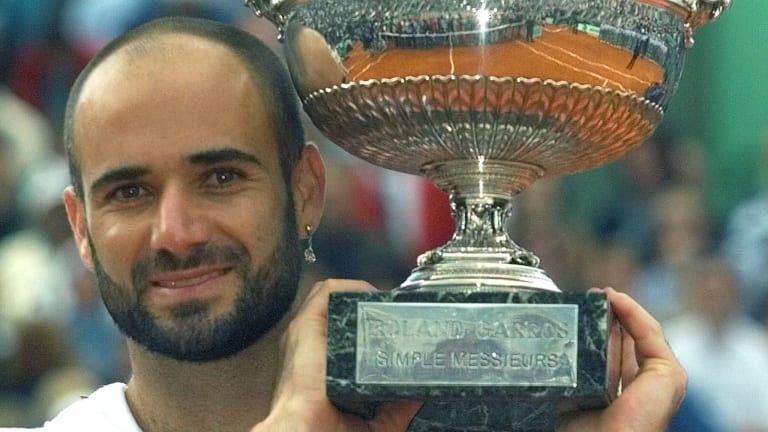This year marks the 50th anniversary of TENNIS Magazine's founding in 1965. To commemorate the occasion, we'll look back each Thursday at one of the 50 moments that have defined the last half-century in our sport.
Andre Agassi and Andrei Medvedev had spent the spring of 1999 smiling slyly and waving to each whenever their paths crossed. While Andrei the Russian was playing some of the best tennis of his career, Andre the American could take more than a little credit for his success.
That April in Monte Carlo, Agassi had come across Medvedev drinking himself into a stupor at a bar after a painful defeat. The 24-year-old Medvedev told Agassi he was through, he was old, he couldn’t play “this f---ing game anymore.”
Agassi, as he recounted in his autobiography, Open, sat down and talked him out of it.
“How dare you,” Agassi said. “Here I am, 29, injured, divorced, and you’re [complaining] about being washed up at 24? Your future is bright.”
Medvedev asked for a few tips, and Agassi obliged. Whatever he said worked. Medvedev spent the next month “on fire,” as Agassi put it. Yet now Agassi realized that he may have done his job a little too well. He had reached the French Open final for the first time in eight years; it was the only Grand Slam he had never won. But to do it, he would have to beat Andrei the Russian.
“He has my game,” a brooding, anxious Agassi thought to himself the night before the match. “I gave it to him. He even has my first name. Andrei. It’s going to be Andre versus Andrei. Me versus my doppelgänger.”
The thoughts literally led Agassi to drink. To the shock of his coach, Brad Gilbert, he opened the minibar in his Paris hotel room and downed a vodka in one gulp.
Andre the American, it turned out, was right to be nervous, because Andrei the Russian was still on fire the next day.
“He’s doing everything he’s supposed to do, everything I told him to do,” Agassi thought. “His game is cool, precise, pitiless. He’s wearing plaid shorts, as if we’re at the beach, and in fact he looks as if he’s frolicking on the Riviera.”
Agassi lost the first 6-1 in nineteen minutes. He knew this was likely his last chance at the career Grand Slam, his last chance at the French, his last chance to forget the two finals that he lost here at the start of the decade, both of which he was heavily favored to win. He knew this was his last chance to put the demons of his misspent youth, the memories of his pink spandex outfits, his training meals at McDonalds, his tears of regret, behind him. Agassi knew this was his last chance at redemption, and he knew he was blowing it.
This time, though, there was help, literally from above: It started to rain. The players retreated to the locker room, where Gilbert proceeded to have what may go down as the most useful screaming fit in tennis history. After informing Agassi of everything he was doing wrong, he finished by telling him to “go down with both guns blazing.”
Then, in a final flourish of rage, Gilbert opened a locker and slammed it shut. “The door flaps and clangs,” Agassi said. A minute later, he walked back on court and won. When it was over and Andrei the Russian’s final forehand had sailed long, Agassi rubbed his head and sobbed.
“Winning isn’t supposed to feel this good,” he thought. “But it does.” He walked off court blowing kisses to the four corners of the stadium, and vowed that he would do that after every win for the rest of his career.
Agassi’s triumph at the French Open in 1999 was an end and a beginning. The flashy, “image is everything” underachiever of 10 years earlier had been vanquished. In his place stood a man who had pulled off one of the sport’s unique achievements: At the time, the only other man in the Open era to win a career Grand Slam was Rod Laver. Agassi would go on to win the U.S. Open that fall, finish the year No. 1 (the only time he would do so), and keep himself at the top of the game for seven more years, into his mid-30s.
But destiny, again in the form of Brad Gilbert, wasn’t quite finished with Agassi that spring weekend in Paris. Flying back to New York on the Concorde, Gilbert, with a smile, asked Agassi who had won the women’s event at the French Open that weekend. Agassi smiled back; it was Steffi Graf, a woman he’d had a crush on for years.
That’s right, Gilbert said, before making a seemingly outlandish prediction that, we know now, would come true: By 2001, her name would be Steffi Agassi.
